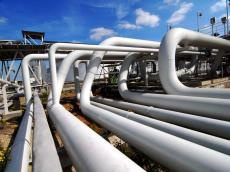|
|
TODAY.AZ / Business
Decrease in gas pipeline losses signals improved efficiency in Azerbaijan
27 June 2024 [13:00] - TODAY.AZ

Azerbaijan has made significant strides in reducing gas losses in its main pipelines, highlighting ongoing improvements in the country's energy infrastructure. During the first quarter of this year, Azerbaijan lost 14.8 million cubic meters of gas in its main pipelines, an 8.6% decrease compared to the same period last year, according to the State Statistics Committee.
This reduction in gas losses is noteworthy given that during the same period last year, losses amounted to 16.2 million cubic meters. The decrease suggests that measures to enhance the efficiency and integrity of the gas transportation network are bearing fruit.
The positive trend extends beyond reduced losses. In January-March of this year, Azerbaijan transported 11,133.6 million cubic meters of gas, marking a 1.2% increase compared to the same period last year. A significant portion of this gas, 50.1%, was transported via the Baku-Tbilisi-Erzurum South Caucasus pipeline, through which 5,582.1 million cubic meters of gas were transferred, representing a 1.28% increase from the previous year.
Last year, the total volume of gas lost in Azerbaijan’s pipelines was 59.8 million cubic meters, an 18.2% increase from the previous year. Despite these losses, Azerbaijan managed to transport 39,283.3 million cubic meters of gas in 2023, a slight 0.1% increase from the previous year. Notably, the Baku-Tbilisi-Erzurum South Caucasus pipeline played a critical role, handling 21,800.1 million cubic meters of gas, which was a 4.8% increase compared to 2022.
The reduction in pipeline losses and the steady increase in gas transportation volumes reflect Azerbaijan's commitment to enhancing its energy infrastructure. These improvements are crucial for maximizing the efficiency of gas transportation and ensuring the reliability of supply to both domestic and international markets. The increased efficiency not only supports economic growth by minimizing waste but also strengthens Azerbaijan’s position as a key player in the regional energy sector.
Moreover, the performance of the Baku-Tbilisi-Erzurum South Caucasus pipeline underscores its significance in Azerbaijan's gas transportation network. The pipeline's ability to handle increased volumes of gas efficiently positions it as a vital conduit for energy exports, reinforcing Azerbaijan's role in the energy supply chain to Europe and other regions.
Azerbaijan's efforts to reduce gas pipeline losses and increase transportation efficiency are yielding positive results. These developments are essential for the country’s economic stability and growth, providing a robust foundation for future advancements in the energy sector.
URL: http://www.today.az/news/business/249969.html
 Print version
Print version
Connect with us. Get latest news and updates.
See Also
- 27 February 2026 [10:41]
Azeri Light gains nearly 2% amid global oil price increase - 25 February 2026 [15:02]
SOCAR and Samsung E&A sign memorandum to boost energy cooperation - 25 February 2026 [13:21]
Azerbaijan’s banking sector to maintain steady profitability, Moody’s reports - 25 February 2026 [10:37]
Azerbaijan to ship another 4,500 tons of diesel fuel to Armenia - 24 February 2026 [19:18]
Sumgayit and Aghdam Industrial Parks drive record growth, expanding export performance - 24 February 2026 [15:02]
Construction materials output jumps sharply in January - 24 February 2026 [10:42]
IsDB allocates $436.7 mln to cut irrigation losses and boost agriculture in Azerbaijan - 23 February 2026 [12:42]
Wind power output surges in Azerbaijan, while thermal plants still dominate - 23 February 2026 [08:30]
Azerbaijan economy set for modest growth despite weak oil prices - 22 February 2026 [12:11]
Weekly review: Crude oil prices see mixed trends
Most Popular
 Events in Sumgayit: it was necessary for everyone except Azerbaijan
Events in Sumgayit: it was necessary for everyone except Azerbaijan
 President Ilham Aliyev holds expanded meeting with Ethiopian PM
President Ilham Aliyev holds expanded meeting with Ethiopian PM
 First Lady Mehriban Aliyeva meets with First Lady of Ethiopia
First Lady Mehriban Aliyeva meets with First Lady of Ethiopia
 Beyond optics: How Israel–India partnership alters Pakistan and Iran’s calculus
Beyond optics: How Israel–India partnership alters Pakistan and Iran’s calculus
 British Embassy in Baku reaffirms support for Azerbaijan’s territorial integrity
British Embassy in Baku reaffirms support for Azerbaijan’s territorial integrity
 Armenian "Ivan Vasilyevich": Seyran Ohanyan's wife may go to jail
Armenian "Ivan Vasilyevich": Seyran Ohanyan's wife may go to jail
 Pakistan declares 'open war' with Taliban as jets bomb Kabul
Pakistan declares 'open war' with Taliban as jets bomb Kabul
